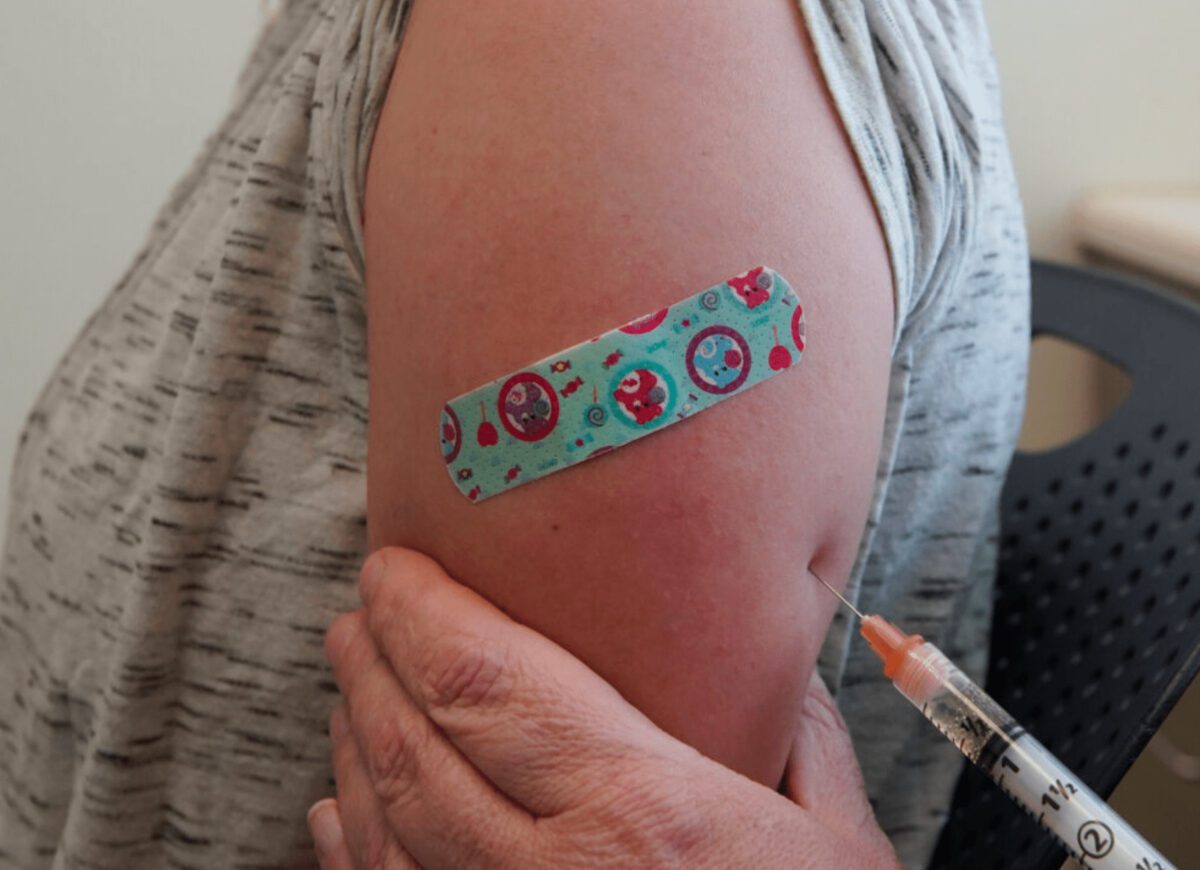
A nurse gives an MMR vaccine at the Utah County Health Department on April 29, 2019, in Provo, Utah. The vaccine is 97% effective against measles when two doses are administered. (Photo by George Frey/Getty Images)
By: Baylor Spears
The Wisconsin Department of Health Services (DHS) is urging residents to get vaccinated amid the confirmation of the first measles cases in the state this year and as families begin back-to-school preparation with vaccine rates still down.
DHS confirmed nine cases of measles in Oconto County over the weekend — the first cases in the state this year. The agency said no public points of exposure have been identified and the risk to the community remains low.
The first case was confirmed through testing at the Wisconsin State Laboratory of Hygiene, and the eight other cases were confirmed based on exposure and symptoms. Each person was exposed from a common source during out-of-state travel.
Dr. Ryan Westergaard, chief medical officer of DHS’s Bureau of Communicable Diseases, told reporters during a press conference Monday afternoon that given the number of cases across the country, the agency has been preparing for its case investigations and outbreak response for months.
“While we were surprised that we had our first cases this past week, we were prepared,” Westergaard said. “We’ve been making sure that we have adequate MMR vaccine in stock and have worked in partnership with all of our local and tribal health departments to make sure that we have a solid response that everyone is aware of, and so far for this case,… things have gone well.”
Cases of the highly contagious disease have hit a 33-year high nationally, according to the Centers for Disease Control and Prevention (CDC). There are reports of over 1,300 cases this year, with more than 150 people having been hospitalized for measles. Three people have died this year.
Measles was declared eliminated in 2000, but decreasing vaccine rates, which have fallen below herd immunity, have led to a resurgence of the disease. Prior to 2025, the last similar outbreak was in 2019 when more than 1,200 cases were confirmed in the U.S.
Westergaard said the state agency is not considering the nine cases in Wisconsin an outbreak because the investigation found a common source during out-of-state travel. He said the agency won’t be releasing additional information about the cases due to state privacy laws. The agency has said it is working to identify and notify people who may have been exposed.
The agency is urging families to get vaccinated in light of the cluster of cases and reported Monday that vaccination rates among students mostly held steady during the 2024-25 school year. Vaccination rates are still below pre-pandemic levels.
“Vaccination is the first line of defense for your child’s health. Each vaccine is approved only after being proven safe and effective,” Stephanie Schauer, director of the Wisconsin Immunization Program, said in a statement. “Taking time now to ensure your children have received the recommended vaccines will make them less likely to get seriously ill, meaning less time out of school and away from work. And routine vaccines don’t just protect your child — they help keep classrooms and the whole community safe.”
During the 2024-25 school year, 86.4% of students met the minimum immunization requirements — a 2.8 percentage point decrease from the 2023-24 school year.
“This tells us that most Wisconsin families are protecting their children with vaccines,” Westergaard said at the press conference. “Unfortunately, this level is below where we need to be to protect our state against outbreaks of vaccine-preventable diseases. As we head into the new school year as a physician and as the father of kids who attend public schools, I want to encourage all caregivers to reach out to a trusted health care provider with any questions or concerns that you have to concern to ensure that students are up to date on their vaccines this year.”
The agency attributed the overall decrease in meeting the immunization requirement to people being unfamiliar with a new meningitis vaccination requirement for 7th and 12th grade students. Without data on the meningitis vaccination, 89.3% of Wisconsin students met the minimum requirements — a 0.1% increase from the 2023-24 school year.
DHS reported in December that families in the state have fallen behind other states when it comes to receiving childhood vaccines including polio, pertussis, diphtheria and tetanus (DTaP), and measles, mumps, and rubella (MMR). When it comes to measles in particular, Wisconsin has one of the lowest vaccination rates in the country.
Measles can spread from person to person through the air, and the vaccines to prevent it are highly effective. One dose of the MMR vaccine provides about 93% protection from measles, while two doses are about 97% effective.
“Our school vaccination data tells us there are children in our schools who are not protected from an outbreak of preventable diseases like measles,” State Health Officer Paula Tran said in a statement. “In public health, we know that 95% of people in a community need to be vaccinated against measles in order to prevent an outbreak, which is why it’s so important to get children the vaccines they need on time.”
Milwaukee city leaders, looking to take preventative steps due to the measles cases, also urged residents to get vaccinated on Monday.
“As a father and as mayor, I take this threat seriously,” Mayor Cavalier Johnson said in a statement. “We’ve seen how quickly diseases can spread when vaccination rates fall behind.”
Children’s Wisconsin President of Pediatrics Dr. Mike Gutzeit emphasized that serious side effects from the MMR vaccine are rare.
“The risk from measles itself is far greater. When families choose not to vaccinate, they’re not just putting their own children at risk, but also newborns and people with weakened immune systems,” Gutzeit said. “Measles was nearly eliminated in the U.S., but now we’re seeing hundreds of cases and hospitalizations again. We can’t afford to go backward.”
Other vaccine-preventable illnesses surged in classrooms last year, according to DHS. Nearly 3,000 cases of pertussis, or whooping cough, were reported.
The measles cases and data on school vaccine rates come as some Republican lawmakers are seeking to increase awareness of vaccine exemptions. Sen. Rachael Cabral-Guevara (R-Appleton) and Rep. Lindee Brill (R-Sheboygan Falls) recently introduced a bill that seeks to highlight Wisconsin’s vaccine exemptions, saying there isn’t enough transparency around them. Current law already requires that schools and day care providers “inform the person in writing of the person’s right to a waiver.”
During the 2024–2025 school year, 6.7% of students had a waiver for one or more vaccinations. Of those, 5.8% of students had a personal conviction waiver, 1% had a religious waiver and 0.4% had a health waiver.
Westergaard said the rate of waivers in Wisconsin is higher than other states.
“We’re one of only 13 states that has the personal conviction waiver. Many states do not allow that,” Westergaard said, adding that health forms typically include notice of the waiver availability.
“We feel in public health that knowledge of the exemptions of the waivers is commonplace,” Westergaard said. “We don’t hide them, but our recommendation is that people get their kids vaccinated because we, as a public health entity, feel any risks far outweighed by the benefit, both to individual health and to our community health.”
Westergaard said those with concerns should speak with a trusted physician and be open with their questions.
“For many families, childhood immunizations are a fact of life, and they’ve accepted them when they’re recommended, but we know other families have questions and concerns,” Westergaard said. “If there are questions you have, if there is information that you’ve seen online or heard that makes you question the safety or the effectiveness, let’s talk about them… There’s near unanimity among people who have seriously reviewed MMR safety data and other childhood vaccine data that they are on balance very safe and very effective and continually monitored for safety and adverse effects.”
Related: Everything Wisconsin needs to know about Trump’s cuts to Medicaid and BadgerCare

Western Wisconsin woman: ‘I am alive today because abortion saved my life’
Legislative Democrats are behind a bill to protect Wisconsinites like Megan, whose access to reproductive health care saved her life. In La Crosse...

Billionaires get richer while Wisconsinites lose access to health care with ‘Beautiful Bill’
The US Senate will examine the Trump budget bill this week. It includes the largest cut to Medicaid in the program's history. It also blocks...

Wisconsin Republicans and Democrats agree on postpartum Medicaid coverage—but the Speaker doesn’t
The Wisconsin Senate passed a bill this week with overwhelming support from both sides of the aisle to expand Medicaid coverage for new moms for a...

Opinion: Pentagon contractors don’t save lives or money – Medicaid does. Don’t cut it.
Cutting life-saving services to further enrich billionaires and Pentagon contractors is the worst possible option. This op-ed was first published on...




